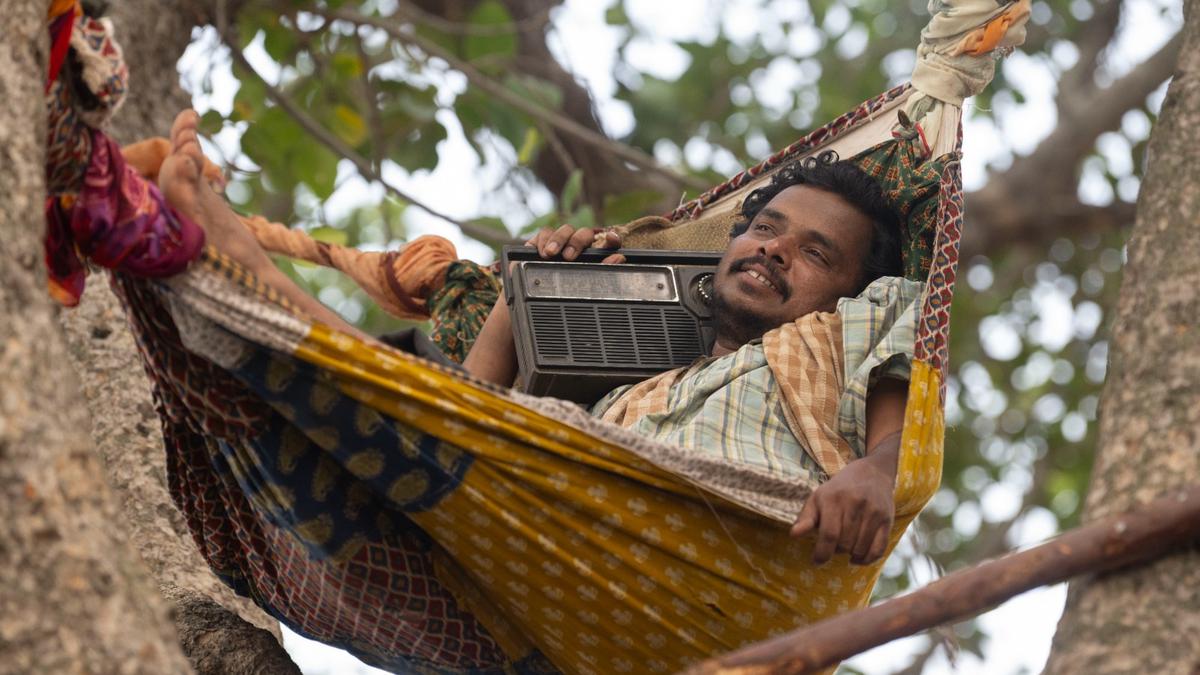
‘Martin Luther King’ movie review: Sampoornesh Babu’s sharp political satire is a timely reminder of the power of voting
The Hindu
‘Martin Luther King’ movie review: Sampoornesh Babu is effortlessly authentic in director Puja Kolluru’s sharp political satire that also reflects caste and class divides. The film is an adaptation of Madonne Ashwin’s Tamil film ‘Mandela’ starring Yogi Babu, and has been written in Telugu by Venkatesh Maha
It may be by design or coincidence that the Telugu political satire Martin Luther King, an adaptation of director Madonne Ashwin’s Tamil film Mandela, is releasing in theatres a month before the elections in Telangana. Nevertheless, it is a relevant and timely film. Debut director Puja Kolluru retains the essence of Madonne Ashwin’s story and uses Venkatesh Maha’s screenplay and dialogues rooted in the milieu of Telugu States to remind us that voting is both our right and a privilege. Soaked in humour, the Sampoornesh Babu starrer explores the intersections of politics, caste and class, asserting that even a single vote can be a powerful tool to bring about social change.
To begin with, it is imperative to state that Martin Luther King (MLK) works beautifully, irrespective of whether you have watched Mandela. One aspect that works in favour of this adaptation is the casting of Sampoornesh Babu in the title role. He has that face-in-the-crowd persona required to play this part, just like actor Yogi Babu in the Tamil original.
MLK unravels in a far-flung, arid village that has not witnessed any significant development, thanks to two warring groups that are referred to as Northerners and Southerners. An elderly leader in the village has two wives; he apparently married one woman from each groups to bring some semblance of unity and peace to the village! Decades later, he is withering and watching his two sons — Jagjivan Ram (Naresh) and Lokamanya Tilak (Venkatesh Maha) — continuing the war between the two groups. They may be named after freedom fighters, but they care less about the country or their village. Fights break out over the smallest issues such as who will inaugurate the lone public toilet or who will use it first. Caste pride overrides everything else.
MLK does not name the castes and political groups, but the caste and class wars and the social apathy portrayed here can be extrapolated to any part of the country. Only two in the village belong to neither of the groups — the cobbler Smile (Sampoornesh) who has forgotten his real name and is most often beckoned by the villagers with some phrase of insult, and his assistant Bata (Chakradhar). We infer that these two are of a lower caste than the Northern and Southern groups since they always enter people’s homes through the backdoor to complete errands. Their discrimination has been normalised to the extent that neither they nor the village think it is inappropriate. At least Bata shows his disapproval occasionally, Smile doesn’t think much of it. The scene in which both of them stand facing the post office wall, wondering how to enter since it has no back door, is an example of how much discrimination they have faced.
Ashwin Madonne’s story introduces a newcomer in the form of the woman postmaster Vasantha (Sharanya Pradeep), a product of education and progressive thinking. She gives Smile a new name — Martin Luther King. It is a mark of respect to the leader who stood up for the identity and recognition of Black Americans and signifies a new identity for Smile. Smile also gets a voter ID and all of a sudden, his vote is the most coveted since it can swing the elections in the village. From being nameless, he becomes King and the kingmaker.
Puja does not alter the source material much, except giving Smile a different profession, making him a cobbler unlike the hairstylist in the Tamil film. Much of the wit comes from recreating sequences from the original film and yet, it remains sharp thanks to the dialogues and the actors who play the villagers. Many of them are given slight quirks in behaviour and their manner of speaking and none of them strike a false note. They come across as natives of the village who are oblivious to the world at large. Naresh is the only one who looks like he is plucked out of a mainstream film; Maha blends into the village milieu easily.
Satire permeates the narrative, right from the opening scene when a villager uses the torchlight from his mobile phone and thanks ‘digital India’ while looking for a spot to defecate. The adaptation also makes a comment on the forgotten hero, Mahatma Gandhi.

More than 2.6 lakh village and ward volunteers in Andhra Pradesh, once celebrated as the government’s grassroots champions for their crucial role in implementing welfare schemes, are now in a dilemma after learning that their tenure has not been renewed after August 2023 even though they have been paid honoraria till June 2024. Disowned by both YSRCP, which was in power when they were appointed, and the current ruling TDP, which made a poll promise to double their pay, these former volunteers are ruing the day they signed up for the role which they don’t know if even still exists

















